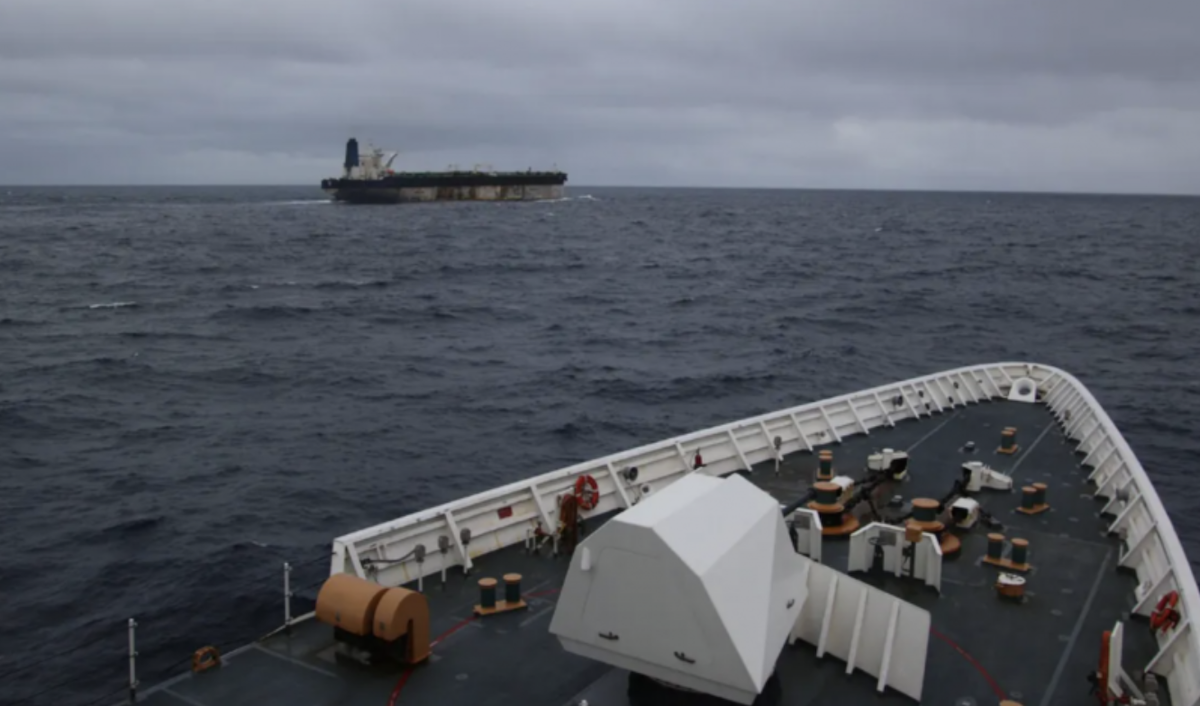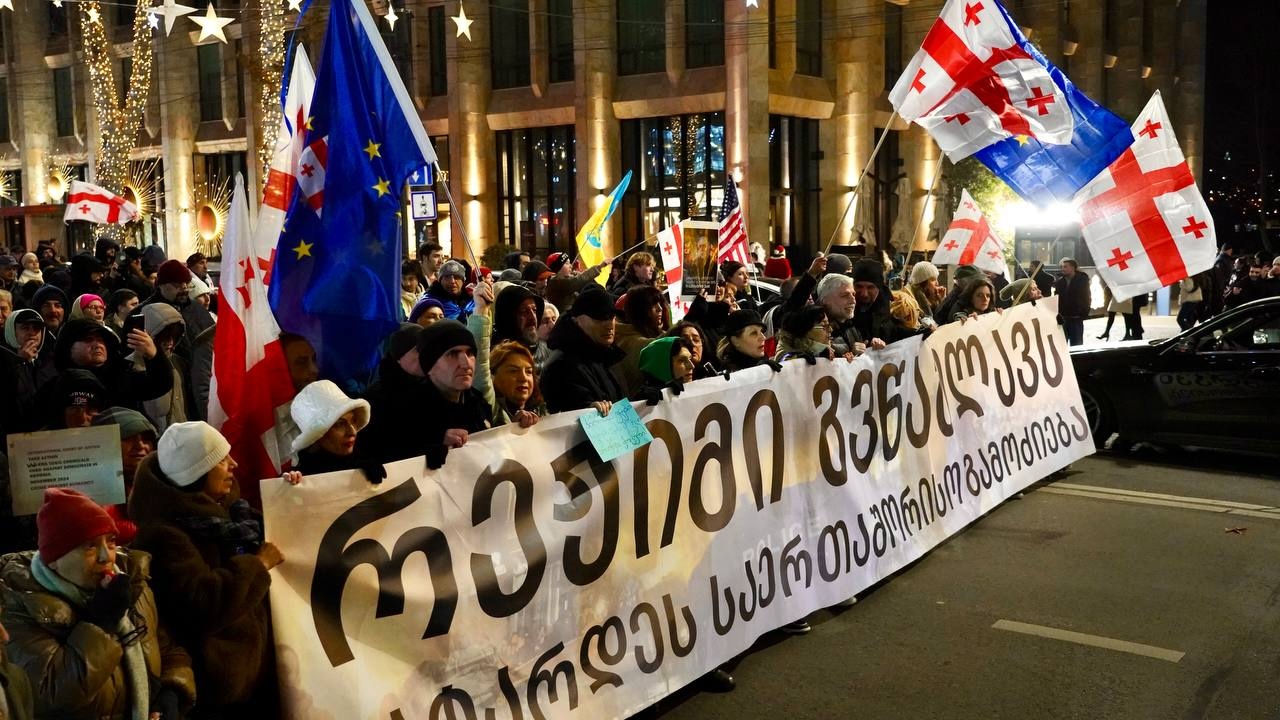Explainer: why the monitoring of goods through Abkhazia, South Ossetia is so contentious
The transit of goods between Russia and Georgia via Abkhazia and South Ossetia is an issue of enormous contention.
An agreement was reached between Georgia and Russia back in 2011 on The Basic Principles of the Mechanism of Customs Administration and Monitoring of Trade in Goods, for the implementation of which a special commission was created.
The commission will meet on 6 February 2019.
• What do Abkhaz and Ossetians make of Georgia’s ‘A Step Towards a Better Future’ proposal?
• North Ossetia-Georgia: invisible ties
• Op-ed: the Georgian-Abkhaz dead-end
The last time this delicate issue was discussed was in May 2018 at a meeting between Special Representative of the Prime Minister of Georgia for Relations with Russia Zurab Abashidze and Russian Deputy Foreign Minister Grigory Karasin.
The talks did not, however, result in an implementation agreement.
JAMnews offers an in-depth look at the issue, as well as an analysis on what the parties agreed upon, and what the main obstacles are for the implementation of the agreement.
We also provide a brief look at what Armenia stands to gain.
Background
Highways and railways from Russia through Abkhazia and South Ossetia to Georgia and further on into Armenia were the easiest means of transit and transport during the Soviet Union for the region, both for the population and for the delivery of goods. However, after the Georgian-Ossetian and Georgian-Abkhaz military conflicts in the early 1990s, the roads closed and movement came to a complete halt. Trade through the conflict zones continues, albeit illegally, posing a risk for sellers and buyers from all three sides: Georgia, Abkhazia and South Ossetia.
In 2008, Russia recognized the independence of Abkhazia and South Ossetia, after which Georgia broke off diplomatic relations with Russia.
The agreement
The agreement signed in November 2011 on The Basic Principles of the Mechanism of Customs Administration and Monitoring of Trade in Goods after protracted and complicated negotiations was brokered by Switzerland between Moscow and Tbilisi.
The following conditions were discussed:
• Georgia conceded and agreed to Russia’s accession into the World Trade Organization (WTO);
• Moscow conceded to the independent monitoring of the movement of goods from Russia to Abkhazia and South Ossetia.
This was significant because back in 2008, Russia recognized both regions as independent states and therefore did not want to agree to the independent monitoring of cargo (by a third party).
A difficult compromise was reached as a result: the creation of three trade corridors between Georgia and Russia.
One passing through Abkhazia:

The second through South Ossetia:
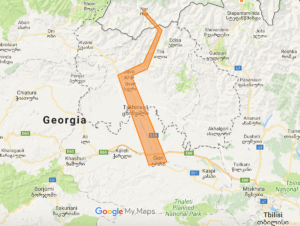
The third is the road through the only Georgian-Russian land checkpoint, Verkhny Lars (in North Ossetia):
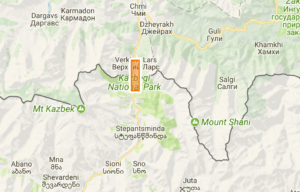
The monitoring of all goods moving through the corridors was to be conducted by a neutral international observer, Swiss company SGS. This concerns cargo going from Russia to / through Abkhazia and South Ossetia (and vice versa), as well as cargo from central regions of Georgia to / from Abkhazia and South Ossetia.
A total of four monitoring points are to be created per the agreement:
Two on the Russian side – one in near Sochi and one near Vladikavkaz.
Two from the Georgian side – one at the Inguri River and one near Gori.
The agreement deliberately avoids mentioning the status of Abkhazia and South Ossetia and only indicates their geographical coordinates.
One important component is that the agreement does not oblige the parties to open a transport corridor in any direction, though it does lay the groundwork.
Why has the agreement been impossible to implement for eight years?
A number of points in the agreement have entailed laborious discussions between both Georgia and Russia.
Progress was made in 2018 when both parties — Georgia and Russia — signed contracts with the Swiss intermediary named in the agreement, SGS.
In January 2019, all the procedures necessary for the practical implementation of the agreement were completed. Although the amount that Georgia and Russia will pay SGS was not officially disclosed, Kommersant estimates that each country will pay $5 million a year.
However, the process still has not started due to different interpretations of the points of the agreement.
Different interpretations, points of contention
Since the document is not public and has never been published, it leaves much room for interpretation.
Radically opposite interpretations of the document on both sides prevented Moscow and Tbilisi in 2018 from agreeing to the start of the practical implementation of the project.
The discrepancies are related to the difference in the concept of “monitoring of goods” – which is a check at any stage of the journey, and “customs inspection of cargo” – which can only occur at an official state border.
Georgia insists that monitoring is the key issue, while Russia says the agreement would amount to customs inspection.
Before the meeting which is scheduled to take place on 6 February 2019, the Russian media launched a campaign with allegations that Georgia had changed its position, which the Georgian Foreign Ministry categorically denied.
On 4 February 2019 Kommersant wrote about the imminent start of the implementation of the agreement. In particular, a comment by an anonymous Russian diplomat was given which stated: “The main point of the agreement is that after 2008, new customs borders of Georgia were drawn.”
Another Russian publication, Lenta.ru, reported with reference to a Russian government official that Georgia is in fact losing ground:
“In essence, the obligations under the agreement force Georgia to recognize Abkhazia and South Ossetia as independent customs territories.”
While “Georgia makes an important concession to Russia” was the title of an analytical article in the Russian business newspaper Vzglyad.
Many in Georgia have been outraged by this interpretation, warning the Georgian government on social media not to “betray” the state.
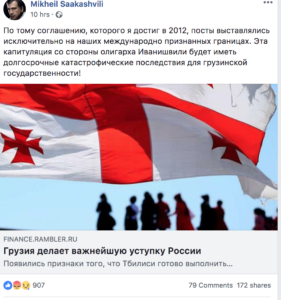
“According to the agreement I reached in 2012, posts were set up exclusively at our internationally recognized borders. This capitulation by the oligarch Ivanishvili will have long-term catastrophic consequences for Georgian statehood!”, the former Georgian president Mikhail Saakashvili wrote on his Facebook page.
However, the Ministry of Foreign Affairs of Georgia made a special statement in which it emphasized that the opening of new customs points on the border with Abkhazia and South Ossetia will not be discussed at the 6 February meeting.
Minister David Zalkaliani said that the 2011 agreement provides for monitoring cargo shipments and that there is no question at all of the deployment of customs services, including from the Swiss company.
“It is a private Swiss company that will monitor cargo between Georgia and Russia,” said Zalkaliani.
A Western diplomat directly related to the negotiation process and the implementation of the agreement also explained in an interview with JAMnews that cargo monitoring, which, according to the agreement, will be carried out by a Swiss company, has nothing to do with opening any customs points:
“This is a different matter entirely,” the diplomat said.
Russia’s Deputy Foreign Minister Grigori Karasin, said in an interview with Kommersant newspaper on 4 February that there was no need to “politicize” the topic nor a need to wait for miraculous breakthroughs.
At the end of February, Karasin and the special representative of the Prime Minister of Georgia, Zurab Abashidze, intend to hold a meeting during which they will discuss the process of the implementation of the agreement.
“We are faced with serious technical and logistical work, and it will take time and perseverance,” said Karasin.
Will transit corridors open?
Despite repeated appeals from both sides to “not politicize the topic,” that is exactly what has been happening.
The Georgian authorities said immediately after the document was signed in 2011 that they had reached their goal, since neutral observers would stand on the borders between Russia and the occupied territories of Georgia.
The public in Abkhazia and South Ossetia, as well as some Russian experts, strongly oppose the agreement saying that Moscow and Tbilisi signed a document concerning the transit of goods through the territory of Abkhazia and South Ossetia without asking for their opinion. This was seen as a sign of disrespect for the sovereignty of the republics, the independence of which has been recognised by Russia.
The second stage of the political debate around the document began in 2016 when Russia started talking about the resumption of transport links with Georgia on the basis of the 2011 agreement.
Thereafter the Georgian opposition began to warn the government against actions that might be to the detriment of Georgia’s sovereignty.
Armenia as an interested party to the discussions
Another party is interested in the transit of cargo between Russia and Georgia – Armenia. For Armenia, additional land connections with Russia are important. Though a road exists through Upper Lars, it often closes in winter, and in summer its shipping capacity is not large enough.
In 2016, the then Prime Minister of Georgia Giorgi Kvirikashvili mentioned the possibility of an alternative route through South Ossetia for Armenia on the basis of the 2011 agreement. However, it is only to be used in case of emergencies such as if Verkhni Lars is closed.
The issue of transit of Armenian goods still depends on the resolution of political differences between Russia and Georgia, including the matter of interpreting the terms of the 2011 agreement.


















